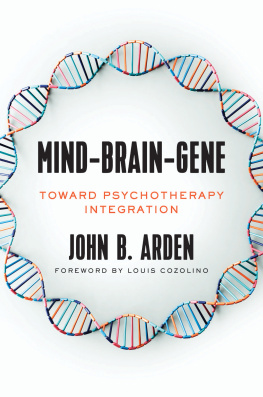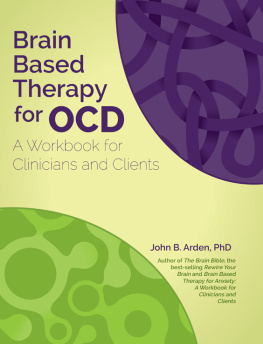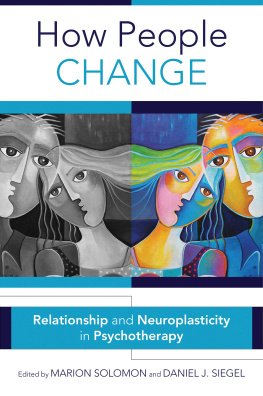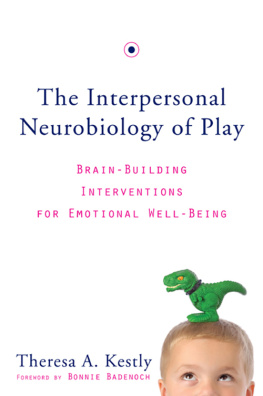Contents
Guide

ADVANCE ACCLAIM
The evolution of psychotherapy points toward integration and this book leads the way.
Bill OHanlon, featured Oprah author of Do One Thing Different
This book provides a quantum leap into understanding how the interactions of brain, mind, and body, in an ever-changing environment, determine the meaning and quality of our existence. The inevitable results of contemplating this mind-altering synthesis is to live life more fully while positively affecting the lives of others. Everyone who cares about mental and physical health owes a huge debt of gratitude to John Arden for this brilliant contribution to the science of well-being.
Harvey Milkman, Ph.D., Professor Emeritus, Metropolitan State University of Denver, Author of Craving for Ecstasy and Natural Highs , Fulbright Scholar, Reykjavik University, Iceland
The discovery of interactions between the mind, brain, and our genes is constantly being developed. It is critical for health professionals to have a complete overview of the current research within this field. John Ardens book is an excellent source of scientific summaries and therapeutic implications. It points towards the psychotherapy of the 21st century.
Anna Leybina, Ph.D., Director, Centre for International and Regional Projects at Civil Service and Personnel Directorate, Moscow Government
John Arden has very creatively and in simple language represented the complex multi-directional causal relationships that explain the vast field of psychoneuroimmunology and epigenetics, along with cognitive dynamics, that provide an integrated psychotherapy approach. The simple language of the book makes it easy to comprehend and apply the information in the field of therapy. Each student of health psychology and practitioners of psychotherapy must read this book to get this holistic perspective.
Sanjeev Sahni, Ph.D., Director of the Institute of Behavioral Sciences, O. P. Jindal Global University, India
The Norton Series on Interpersonal Neurobiology
Louis Cozolino, PhD, Series Editor
Allan N. Schore, PhD, Series Editor, 20072014
Daniel J. Siegel, MD, Founding Editor
The field of mental health is in a tremendously exciting period of growth and conceptual reorganization. Independent findings from a variety of scientific endeavors are converging in an interdisciplinary view of the mind and mental well-being. An interpersonal neurobiology of human development enables us to understand that the structure and function of the mind and brain are shaped by experiences, especially those involving emotional relationships.
The Norton Series on Interpersonal Neurobiology provides cutting-edge, multidisciplinary views that further our unprderstanding of the complex neurobiology of the human mind. By drawing on a wide range of traditionally independent fields of researchsuch as neurobiology, genetics, memory, attachment, complex systems, anthropology, and evolutionary psychologythese texts offer mental health professionals a review and synthesis of scientific findings often inaccessible to clinicians. The books advance our understanding of human experience by finding the unity of knowledge, or consilience, that emerges with the translation of findings from numerous domains of study into a common language and conceptual framework. The series integrates the best of modern science with the healing art of psychotherapy.
A NORTON PROFESSIONAL BOOK
MINDBRAINGENE
Toward Psychotherapy Integration
JOHN B. ARDEN
Foreword by Louis Cozolino

NOTE TO READERS: Standards of clinical practice and protocol change over time, and no technique or recommendation is guaranteed to be safe or effective in all circumstances. This volume is intended as a general information resource for professionals practicing in the field of psychotherapy and mental health; it is not a substitute for appropriate training, peer review, and/or clinical supervision. Neither the publisher nor the author can guarantee the complete accuracy, efficacy, or appropriateness of any particular recommendation in every respect.
Copyright 2019 by John B. Arden
All rights reserved
First Edition
For information about permission to reproduce selections from this book, write to Permissions, W. W. Norton & Company, Inc., 500 Fifth Avenue, New York, NY 10110
For information about special discounts for bulk purchases, please contact
W. W. Norton Special Sales at specialsales@wwnorton.com or 800-233-4830
Author Photo by Dham Khalsa
Jacket design by Adly Elewa
Production manager: Katelyn MacKenzie
The Library of Congress Cataloging-in-Publication Data
Names: Arden, John Boghosian, author.
Title: Mind-brain-gene : toward psychotherapy integration / John B. Arden.
Other titles: Norton series on interpersonal neurobiology.
Description: New York : W. W. Norton & Company, [2019] | Series: Norton series on interpersonal neurobiology | A Norton Professional Book. | Includes bibliographical references.
Identifiers: LCCN 2018022160 | ISBN 9780393711844 (hardcover)
Subjects: | MESH: Mental Disorderspsychology | Psychotherapymethods |
Brainphysiology | Genetic Phenomenaphysiology | Immune System Phenomenaphysiology
Classification: LCC RC480.5 | NLM WM 420 | DDC 616.89/14dc23 LC record available at https://lccn.loc.gov/2018022160
ISBN: 978-0-39371-185-1 (ebk.)
W. W. Norton & Company, Inc., 500 Fifth Avenue, New York, N.Y. 10110
www.wwnorton.com
W. W. Norton & Company Ltd., 15 Carlisle Street, London W1D 3BS
Dedicated to the countless healthcare professionals who have committed their lives to helping the millions of traumatized refugees.
Contents


As we move deeper into the 21st century, we carry with us a wealth of data, theoretical knowledge, and new technologies unimaginable just a few short years ago. As a result, we are moving past the linear logic and simplistic nature-nurture debates so prevalent during the 20th century. We now find ourselves thinking in terms of complexity, self-organizing systems, and the synergistic interactions of mind, brain, genes, and culture that create all living systems and give rise to human experience. These new discoveries are important scientific advancements that are leading us to a deeper and hopefully more accurate understanding of mental health and mental illness. It is my pleasure to welcome MindBrainGene into the Norton Series in Interpersonal Neurobiology as part of this important movement.
In this new book, John Arden takes a long stride forward in articulating an emerging model of clinical theory, case conceptualization, and therapeutic practice that attempts to integrate these new scientific findings into clinical practice. Multiple areas of research from genetics, epigenetics, and neuroscience, to attachment, development, and psychoneuroimmunology have demonstrated the complex interconnection taking place between our minds, brains, and genes during lifelong adaptation and change. While many are overwhelmed by the complexity of these multiple fields and retreat to narrow definitions of how to modes of therapy, Dr. Arden takes on these challenges with interest, enthusiasm, and compassion.














